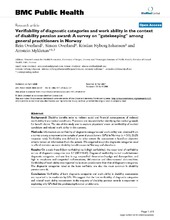Verifiability of diagnostic categories and work ability in the context of disability pension award: A survey on "gatekeeping" among general practitioners in Norway
Peer reviewed, Journal article

Permanent lenke
https://hdl.handle.net/1956/2706Utgivelsesdato
2008-04-25Metadata
Vis full innførselSamlinger
Originalversjon
https://doi.org/10.1186/1471-2458-8-137Sammendrag
Background Disability benefits exist to redeem social and financial consequences of reduced work ability from medical conditions. Physicians are responsible for identifying the medical grounds for benefit claims. The aim of this study was to explore physicians' views on verifiability of medical conditions and related work ability in this context. Methods Information on verifiability of diagnostic categories and work ability was obtained from a survey among a representative sample of general practitioners (GPs) in Norway (n = 500, 25.2% response rate). Verifiability was defined as to what extent the assessment is based on objective criteria versus on information from the patient. We enquired about the diagnostic categories used in official statistics on main disability benefit causes in Norway and elsewhere. Results On a scale from 0 (low verifiability) to 5 (high verifiability), the mean level of verifiability across all diagnostic categories was 3.7 (SD = 0.42). Degree of verifiability varied much between diagnostic categories, and was low in e.g. unspecified rheumatism/myalgia and dorsopathies, and high in neoplasms and congenital malformations, deformation and chromosomal abnormalities. Verifiability of work ability was reported to be more problematic than that of diagnostic categories. The diagnostic categories rated as the least verifiable, are also the most common in disability pension awards. Conclusion Verifiability of both diagnostic categories and work ability in disability assessments are reported to be moderate by GPs. We suggest that the low verifiability of diagnostic categories and related work ability assessments in the majority of disability pension awards is important in explaining why GPs find the gatekeeping-function problematic.